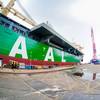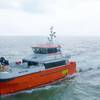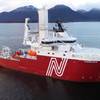In its first public statement on the Jones Act, the Bush Administration has declared the law must be maintained as “an essential element of U.S. maritime policy that provides important economic and national security benefits to the nation, such as support of the U.S. shipbuilding and ship repair industries, and maintenance of a labor base of skilled American mariners.”
Transportation Secretary Norman Mineta made the statement in response to a written question following his confirmation hearing before the Senate Commerce Committee. The Jones Act requires that cargo moving between U.S. ports be carried in vessels that are U.S.-owned, -built and -crewed. Similar U.S. cabotage laws reserve the movement of passengers and the performance of marine services such as dredging, towing and salvage to U.S.-owned, -built and -crewed vessels.
During the 2000 campaign, the Bush/Cheney ticket issued an equally strong statement of support for the Jones Act. “Programs that have contributed to the growth of our domestic fleet, such as the Jones Act ... should be maintained,” Bush declared when a candidate for the nation’s highest office.
Phil Grill, Chairman of the Maritime Cabotage Task Force, thanked the Administration for its continued commitment to a U.S.-flag fleet in domestic waterborne commerce. “The Bush Administration understands the importance of a healthy U.S.-flag domestic fleet, both in terms of the nation’s economic well-being and its national defense capabilities. America’s Jones Act fleet is so efficient it transports nearly one fourth of the nation’s domestic cargo for only 2 percent of the freight bill. Jones Act vessels also provide nearly 90 percent of the jobs available to American mariners. In times of crisis, Jones Act ships play a vital role in delivering equipment and supplies to U.S. military forces overseas and provide additional sailors to crew the U.S. Government’s own sealift ships activated from reserve or reduced operating status. As long as America maintains the Jones Act as the foundation of U.S. maritime policy, U.S.-flag vessel operators will efficiently meet the needs of waterborne commerce while sustaining the maritime infrastructure that contributes so significantly to our national defense capabilities.”
The Maritime Cabotage Task Force was founded in 1995 to promote the U.S.-flag fleet engaged in domestic commerce. Nationwide, there are more than 37,000 vessels in the Jones Act fleet generating nearly 125,000 jobs, 80,000 of which are shipboard. The Jones Act fleet represents a $26 billion private sector investment in vessels and infrastructure and routinely moves more than 1 billion tons of cargo and 100 million passengers each year.
The new millennium has seen an unprecedented growth of the Jones Act fleet. Approximately 140 commercial vessels of all types with a market value of more than $4.4 billion are under construction in American shipyards. Included in that total are the first large U.S.-flag cruise ships in more than 40 years, a number of double-hulled tankers and tank barges that meet the requirements of OPA90, and a new generation of roll-on/roll-off cargo carriers that incorporate the latest in environmental safeguards. Pending are contracts for another 150 vessels.
Dimensional accuracy in steel cutting is a critical element in shipbuilding production efficiency, enhancing the ease and quality of fitting and welding steel parts, while minimizing costly rework. Bender Shipbuilding and Repair Incorporated of Mobile, Alabama is the first U.S. shipbuilder to prove the utility of using a laser to cut steel during construction of naval vessels. Under sponsorship of the National Shipbuilding Research Program (NSRP) Advanced Shipbuilding Enterprise (ASE), Bender is sharing the results of their implementation industry-wide. Many positive aspects of laser cutting technology are being considered for future application by Navy and commercial shipbuilders.
NSRP ASE (www.nsrp.org) is a NAVSEA-industry applied research program that focuses research and development funding on shipbuilding processes and technologies that will reduce the cost of Navy warships and help the U.S. shipbuilding industry be more commercially competitive. Bender is one of 11 members in the NSRP industry consortium, which also includes Atlantic Marine, Avondale, Bath Iron Works, Cascade General, Electric Boat, Halter Marine Incorporated, Ingalls, National Steel and Shipbuilding Company (NASSCO), Newport News Shipbuilding and Todd Pacific Shipyards. The current NSRP collaboration chairman is Harvey Walpert of Bender. The laser cutting project is one of 16 major projects currently sponsored by NSRP ASE.
Intent on improving shipyard steel production processes, Bender purchased the steel laser cutter in 1999, the largest now used in the country. Bender teamed with Caterpillar, which had experience with laser cutting in its machinery and marine production. NSRP ASE shares the cost of the project, with the aim of furthering this technology on an industry-wide basis. This NSRP ASE project began in September 1999 and will end in March 2002.
The technology transfer of Bender’s success is a key attribute of NSRP ASE’s focus on collaborative shipbuilding process improvements. All of Bender’s experiences with testing the laser have been documented in NSRP ASE contractually required reports for the industry’s use. Last spring, Bender hosted a demonstration of the laser cutter’s capability. More than 250 shipbuilding, steel and welding industry representatives from around the country, including Navy warship builders, attended the demonstration. As a result, many of the major U.S. shipbuilders are now considering either installing their own laser cutters or buying cut parts from Bender for use in Navy shipbuilding programs. — (Barbara Young, Naval Sea Systems Command)
Featured videos

Inside the Electrified Truckable Tug

Tracking Foreign Vessels Working in the U.S. Jones Act Market

Inmarsat Enhances Service to Drive Digitalization
Subscribe for
Maritime Reporter E-News
Maritime Reporter E-News is the maritime industry's largest circulation and most authoritative ENews Service, delivered to your Email five times per week









